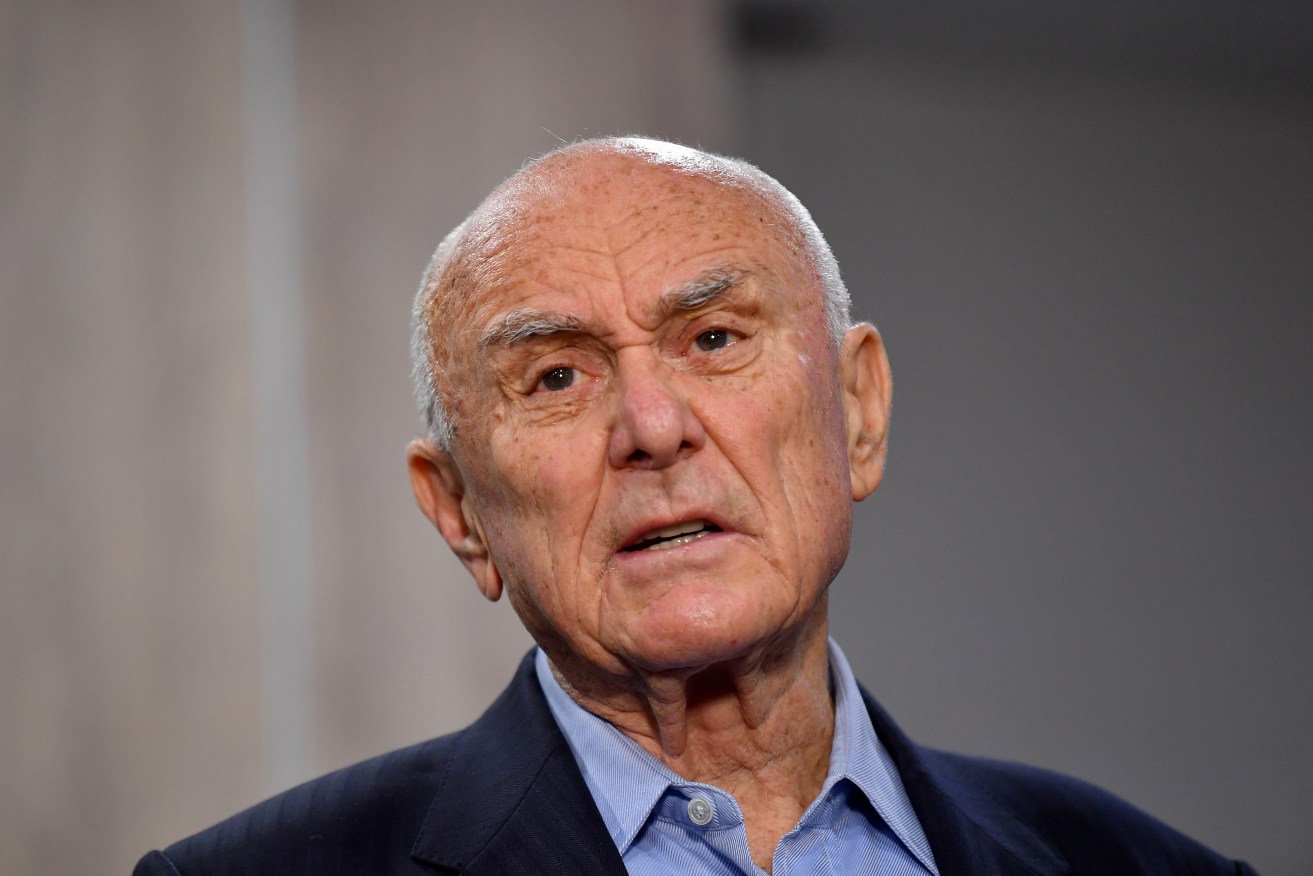Robbed from pillar to post: Why former competition chief says Australia becoming a nation of gougers

Independent Chair, NSW Tolling Review, Prof Allan Fels speaks to the media during a press conference ahead of public hearings, in Sydney, Monday, July 10, 2023. (AAP Image/Bianca De Marchi) NO ARCHIVING
That’s the verdict from leading economist and inaugural Australian Competition and Consumer Commission chair Allan Fels, who pointed to the disparity between Australia and New Zealand’s electric vehicle prices as an example of why investigating pricing is needed.
Professor Fels, as part of a prices inquiry, found the reason behind the disparity was an unwarranted import restriction on electric vehicles.
“New Zealand does not have it and its prices are far lower,” Prof Fels told the National Press Club on Wednesday.
“If we remove that restriction in Australia the price of electric vehicles would fall by about $10,000 and there would be beneficial emission and environmental effects.”
Prof Fels said Australians were paying too much, too often.
He called for a national competition and prices commission, which could look into high prices.
“The cause is weak and ineffective competition in too many markets,” he said.
The commission could give effect to the government’s national competition policy and look at the reasons behind high prices, he added.
The government should also greatly strengthen competition policy to stop enabling price gouging, the economist said.
Prof Fels pointed to the government’s refusal to allow more Qatar flights into Australia as an example of it sanctioning very high prices – in that case, in Qantas’s favour.
He flagged “considerable reservations” about childcare prices, saying both the early childhood education and care sectors were “riddled with overcharging”, principally because of the market’s design and the difficulty for people to switch services.
“Both shaming and price regulation should be considered to rectify overcharging,” Prof Fels has said in a report.
The economist called for legal powers to expose firms that charge excessive prices to be reinstated, after they were used by the coalition in 2000 when the GST was introduced.
Governments should require bank accounts to be portable in the same way they years ago made mobile phone businesses let customers switch suppliers and retain their numbers, he said.
Claims the rise in the profit share of GDP were because of mining prices did not stack up, Prof Fels said.
“The profit share excluding mining has risen and energy and other prices associated with mining have themselves been a very significant contributor to Australian inflation,” he told the press club.
Prof Fels noted the government had accepted there was a strong case for an in-depth review of supermarket pricing.
His inquiry into price gouging was commissioned by the Australian Council of Trade Unions.
HOW ALLAN FELS SAYS AUSTRALIA CAN STOP PRICE GOUGING
A NATIONAL WATCHDOG:
* Establish a national competition and prices commission, which has a “standing review” of the market and examines the reasons behind high prices
* The watchdog would not replace the competition regulator, the Australian Competition and Consumer Commission
* Instead, it would take some of the pressure off the regulator as it continues its enforcement role and performs some price studies
STRENGTHEN COMPETITION LAW:
* Strengthen Australia’s competition law and policy by boosting the provisions of the merger test to stop more potentially anti-competitive mergers
* Reverse the onus of proof in merger cases, as recommended by the competition regulator
* Introduce a law that means big businesses found to have breached competition laws are able to be broken up
* Revive the national competition policy (the government is currently preparing one)
* Shorten Australia’s competition provisions, which are about 20,000 words
INCREASE BANKING PORTABILITY:
* Force banks to make accounts fully portable so customers can switch banks in the same way they can switch telecommunications providers and retain their same phone numbers
* Follow the competition regulator’s advice and make banks more transparent, comparable and proactive in how they alert customers and the public about changes in deposit and bonus rates
REVIEW THE ENERGY MARKET:
* Review the wholesale energy market to see whether it should be redesigned or switched to a system of a capacity market like in the US and Western Australia
* Give the Australian Securities and Investments Commission a ministerial direction to investigate the energy derivatives market to ensure players are not misusing their positions
STOP PAYING MORE FOR ELECTRIC VEHICLES:
* Remove the unwarranted “parallel import restriction” on electric vehicles, which means Australians pay more for them than people in New Zealand
* Removing the restriction would lead to electric vehicle prices in Australia falling by about $10,000 and benefit the environment
REVIEW AND STRENGTHEN SUPERMARKET POLICIES:
* Conduct an in-depth review of supermarkets (the government has accepted this)
* Make the grocery code of conduct mandatory and legally enforceable by the competition regulator
KEEP A CLOSE EYE ON EARLY CHILDHOOD EDUCATION AND CARE:
* Give the competition regulator the power to investigate pricing decisions made by for-profit providers to ensure they are not involved in gaming
* Have the competition regulator continuously review prices in disability care, disability support and aged care
REGULATE AVIATION PRICES:
* Regulate airport prices in the same way other utility prices are regulated
* Take advantage of the government’s existing aviation review by removing international and domestic restrictions on competition
* Review any remaining restrictions under the treasury-led competition policy review
STUDY MEDICAL SPECIALIST FEES:
* Study medical specialist fees in Australia both at a national competition policy level and through a review by the competition regulator or the Productivity Commission
Source: Inquiry into price gouging and unfair pricing practices final report, ACTU












